“Intercourse with Resuscitated Wife” by Ben Marcus
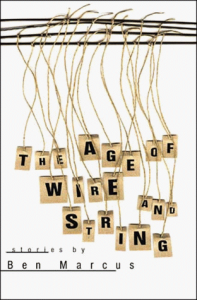 I read Notable American Women before I read The Age of Wire and String, so despite my being somewhat familiar with Marcus and his interviews and his writing, I still wasn’t quite prepared for the kind of ‘language monsters’ he had packed into those 140 pages when I opened the book for the first time in the summer of 2006.
I read Notable American Women before I read The Age of Wire and String, so despite my being somewhat familiar with Marcus and his interviews and his writing, I still wasn’t quite prepared for the kind of ‘language monsters’ he had packed into those 140 pages when I opened the book for the first time in the summer of 2006.
And although the book begins with a sort of prologue, or ‘argument,’ which describes the book as a ‘life project’ meant to catalogue the age of wire and string, I will always think of the opening sentence of “Intercourse with Resuscitated Wife” as the warning shot, a language bunch that reoriented my understanding of how a parcel of words might be arranged in unusual ways.
The dropped articles, the potential comma splice, the archaic tone, the oddity described by the text, all of these I might have seen before, but never in such a sustained and tightly controlled way as this, and not in a contemporary landscape. And furthermore, I hadn’t yet become aware of many of the precursors who made such a collection possible. So to read this first sentence was a bit shocking for me, but in a good way, and helped me take greater care in my reading and writing from then on.
Intercourse with resuscitated wife for particular number of days, superstitious act designed to insure a safe operation of household machinery.
“Cold France” by Wythe Marschall
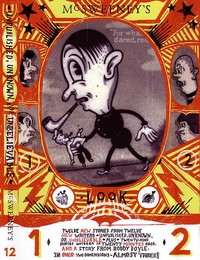 In 2003, McSweeney’s published issue 12, which consisted of 12 unpublished writers and some other stuff. A friend of mine made me buy this issue, and I remember talking with him about one story in particular. It’s the only story I remember from the issue: “Cold France” by Wythe Marschall. I read it on the floor of my bedroom at my parent’s house while home from college during some break or another. Since then, I have occasionally thought of “Cold France” and idly wondered whatever happened to Wythe Marschall. His bio in the contributors’ notes section said that he was nineteen at the time, and so he forever remains nineteen in my head, despite what Google just told me.
In 2003, McSweeney’s published issue 12, which consisted of 12 unpublished writers and some other stuff. A friend of mine made me buy this issue, and I remember talking with him about one story in particular. It’s the only story I remember from the issue: “Cold France” by Wythe Marschall. I read it on the floor of my bedroom at my parent’s house while home from college during some break or another. Since then, I have occasionally thought of “Cold France” and idly wondered whatever happened to Wythe Marschall. His bio in the contributors’ notes section said that he was nineteen at the time, and so he forever remains nineteen in my head, despite what Google just told me.
“Cold France” consists of seventeen short sections, each of which describes a different “permutation” of France. There is “Dog France,” “Whale France,” “Tent France,” “Sponge France,” and “Fat France.” I read that in “Merry France” one Frenchman “simply said ‘fox’ until all of Limoges had died from heart seizures” from laughing so hard. In “Dark France” a man questions his existence: “What is the meaning of darkness? thinks Jean. He wants to move to another country, but he cannot see what ticket to buy at the station. A badger walks into him in the woods when he is on vacation.” In “Slow France” I read “Because each follicle has so long to think over each new molecule of French hair, each French strand is shinier, stronger, and more fit to entertain at parties than other, foreign hairs. So when you get it in the mail, please remember: Whatever you do, don’t cut your French hair.”
“Dance in America” by Lorrie Moore
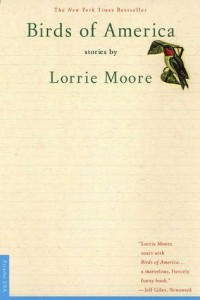 One of the first times I heard Kenny Loggins, I was probably pretty young. Top Gun came out in 1986, so I was probably six years old or so when I first heard “Highway to the Danger Zone.” My father stood in front of the television when they showed Goose dead in Maverick’s arms.
One of the first times I heard Kenny Loggins, I was probably pretty young. Top Gun came out in 1986, so I was probably six years old or so when I first heard “Highway to the Danger Zone.” My father stood in front of the television when they showed Goose dead in Maverick’s arms.
My mother had a cassette tape of Celebrate Me Home and a cassette tape of Loggins and Messina, both of which we all listened to in the car on the way to school.
Many people don’t know this about me, but when I was in 5th grade, I actually saw Loggins in concert. My family was visiting Chattanooga to look for houses, as we planned to move there within the next year, and we visited during the summer when the city has a festival called Riverbend. Loggins performed. I don’t remember much of it, sadly.
“The Mnemogogues” by Primo Levi
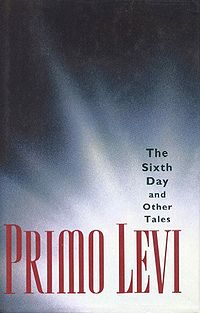 The opening story in Levi’s The Sixth Day and Other Tales, “The Mnemogogues,” was my introduction to Levi. In it, Dr. Morandi, a young physician, arrives at his outpost in a small town in order to take the place of the aging Dr. Montesanto, who speaks to Morandi “about the defnitive prevalence of the past over the present, and the final shipwreck of every passion, except for his faith in the dignity of thought and the supremacy of the things of the spirit.”
The opening story in Levi’s The Sixth Day and Other Tales, “The Mnemogogues,” was my introduction to Levi. In it, Dr. Morandi, a young physician, arrives at his outpost in a small town in order to take the place of the aging Dr. Montesanto, who speaks to Morandi “about the defnitive prevalence of the past over the present, and the final shipwreck of every passion, except for his faith in the dignity of thought and the supremacy of the things of the spirit.”
“Disagreement” by Lydia Davis
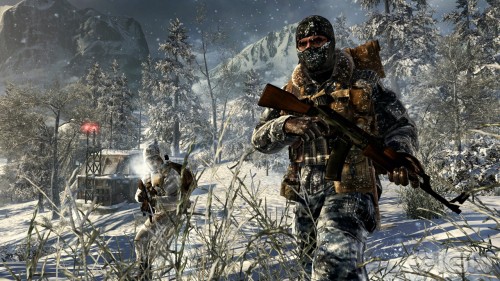
Three months ago I sent in the final version of my manuscript to Amanda and Joseph at Caketrain. To celebrate this accomplishment I bought a PS3 and a copy of Call of Duty: Black Ops, which I played for nearly every day until about a week ago when hackers completely shut down the Playstation Network, suddenly dumping me back into reality.
In the resultant silence, I returned to books, reading in two days the entertaining Aurorarama by Jean-Christophe Valtat, which I recommend. I read In Watermelon Sugar by Richard Brautigan during two consecutive lunch breaks at work. And then I reread a favorite, Stories in the Worst Way by Gary Lutz, to finally recharge myself.
How Like Foreign Objects by Alexis Orgera
Congratulations to HTMLGIANT contributor Alexis Orgera, whose How Like Foreign Objects was just released by H_NGM_N BKS:
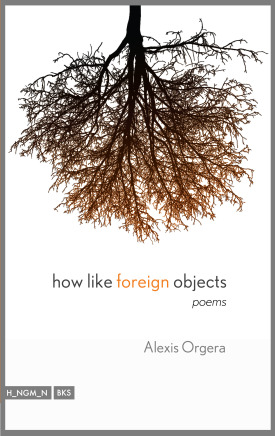
Dean Young had this to say about Orgera’s poems:
Alexis Orgera’s poems perpetually, vitally involve the reconceiving and reenacting of the means of intimacy even as they say again and again, I can no longer be myself. These are love poems between strangers who may for a moment celebrate and endure recognition; their voice is arch, angelic and at odds with itself, mercurial in its metaphoric riches, captivating in improvisational zeal, beautiful, and impossible not to love.
If you’d like to purchase the book, you can do so from H_NGM_N for $14.95. Click on the donate/PayPal button once you get to the HLFO page.
Lydia Millet Interview at Willow Springs
Sam Ligon interviewed Lydia Millet in Willow Springs. You can read the full interview here (pdf).
Millet: I was asked recently whether I considered my taste to be minimalist in prose, and I never thought of myself that way, but I do like a lot of space on the page. That is to say, not actual physical white space, but I like there to be space, as with, say, some Nabokov, where there’s a lot of metaphysical space that’s somehow created by the language. I don’t like to be overwhelmed with words. I don’t want someone to try to do some “Wham, bam, thank you, ma’am” with their verbiage. I want there to be room for the silence of the mind in the reading.
The Pale King Changes
Today at Conversational Reading, Scott Esposito linked to a Google document that showed differences between the recent David Foster Wallace excerpt in The New Yorker titled “Backbone” and a transcription of Wallace reading the same piece in 2000, what Wallace then called ‘a fragment of a longer thing.’
Esposito writes:
It’s common knowledge now that Wallace did not get close to finishing The Pale King, and that the book that will be published on April 15 represents a heavily edited and stitched together version of what Wallace left behind. Clearly, this book has been made to serve the many readers out there who would like to see a completed, standardized version of The Pale King.
For more, go to the full post.
Look! Freaks and Feathers on the West Coast
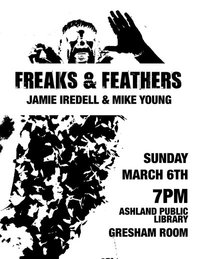 Mike Young and Jamie Iredell are flying out to the west coast today (on an airplane, I think). They want to read to people on the west coast. They are nice people. They are calling their reading tour “Freaks and Feathers.” If you’re on the west coast and interested, check out their reading schedule.
Mike Young and Jamie Iredell are flying out to the west coast today (on an airplane, I think). They want to read to people on the west coast. They are nice people. They are calling their reading tour “Freaks and Feathers.” If you’re on the west coast and interested, check out their reading schedule.
Pilot Books, Seattle WA (TODAY 7pm)
Ampersand, Portland OR (3/5/11 7:30pm)
Ashland Public Library, Ashland OR (3/6/11 7pm)
Rancho Parnassus, San Francisco CA (3/7/11 7pm)
John Natsoulas Gallery, Davis CA (3/8/11 8pm)
KKUP 91.5 FM, Cupertino (3/9/11 8pm)
Cal Poly, San Luis Obispo CA (3/10/11 tba)
Skylight Books, Los Angeles CA (3/12/11 5pm)
If you can, say hi! They’d like to see you too.

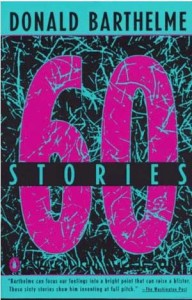 In college I went through a stage of searching for and printing off as many David Foster Wallace interviews as I could find. I remember printing of the
In college I went through a stage of searching for and printing off as many David Foster Wallace interviews as I could find. I remember printing of the